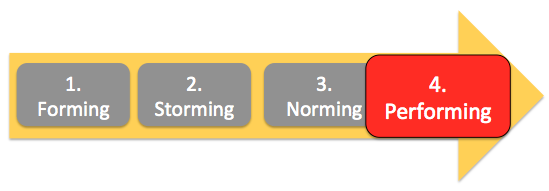The “PERFORMING” Stage of Group Development
(Adapted from Tuckman’s Stages of Small Group Development)
What is the Performing Stage? Now that the group has established group norms and resolved most interpersonal issues, the focus of the group shifts to its tasks. The group now has a structure and a way of working together that will support reaching the goals that group members have set for themselves. In the performing stage, it’s time for the group to get things done. Members are motivated to work together as a cohesive group and they find ways to solve lingering or new disagreements. In this stage, group morale and loyalty are high, and the group is characterized by trust, experience, intimacy, and competence. Everyone’s energy is focused on accomplishing goals, such as improving grades, building school engagement, and developing relationships.
What is the Mentor’s Role? In the performing stage, the role of the mentor shifts from managing group dynamics to focusing on helping members grow and develop in positive ways. Mentors can turn their attention to identifying individuals’ strengths and weaknesses, and helping mentees step out of their comfort zones. Mentors can encourage mentees to try a new strategy for academic success. It is important at this stage for mentors to monitor changes in the group and school environment that could temporarily short-circuit the group’s ability to perform. For example, a change in school policy or the departure of a group member might pull the group back into the storming or norming stages for a time, but mentors can help guide the group quickly through those stages to return to performing. Mentors can also encourage and support the hard work that the group is doing to achieve its goals.
What is the Mentee’s Role? At this point, mentees are able to step up and take greater responsibility for accomplishing goals, and require less supervision than in previous stages. Members are self-assured and provide assurance for others willingly, supporting and assisting one another as needed. Natural leaders within the group have emerged, but it is important for the group to value the contributions and voices of all its members. Mentees are open to shifting roles as different tasks and goals may necessitate different sets of strengths and skills. Roles are meant to be flexible and functional. Mentees should be able to effortlessly move between working individually, within subgroups, or as a whole group. When disagreements do arise (and they will!), they are resolved quickly and with minimal disruption to the group. Mentees are people- and task-oriented, and they keep a sharp focus on the goals at hand.
Activities: Click here for several activities that are appropriate for the performing stage. These activities will help group members work together to achieve their goals.
What happens next? Reaching the performing stage can be a highly rewarding and motivating accomplishment for a group. Often this accomplishment makes saying goodbye that much harder when it is time to end the group. Read more about how to navigate the Adjourning Stage.
References
Abudi, G. (2010). The Five Stages of Team Development: A Case Study. Retrieved from Projectsmart.co.uk.
Ambrosetti, A., & Dekkers, J. (2010). The interconnectedness of the roles of mentors and mentees in pre-service teacher education mentoring relationships. Australian Journal of Teacher Education (Online), 35(6), 42.
Tuckman, B. & Jensen, M. (1977) Stages of Small Group Development. Group and Organizational Studies, 2, 419-427.
Bonebright, D.A. (2010). 40 years of storming: A historical review of Tuckman’s model of small Group development. Human Resource Development International, 13(1), 111-120.
White, A. (2009). From Comfort Zone to Performance Management: Understanding Development And Performance. Belgium: White & McClean Publishing.
